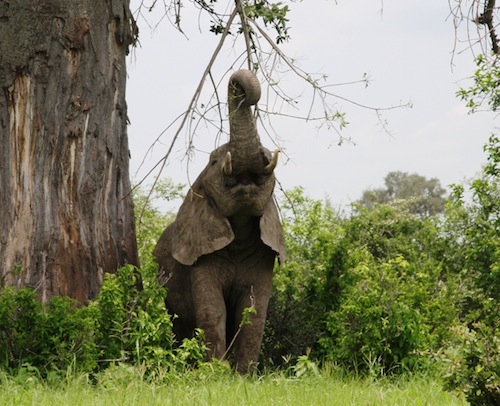by Cindy Tilney

Two international environmental organisations have called on the US government to implement trade sanctions against Mozambique for its official complicity in the ongoing rampant slaughter of elephants and rhinos by Mozambican nationals not only within Mozambique, but also in South Africa and Tanzania.
The Environmental Investigation Agency (EIA) and the International Rhino Foundation (IRF) filed the petition under the Pelly amendment – which authorises the US to impose sanctions on any country that contravenes an international conservation agreement, in this case various CITES agreements.
Since 2010, Mozambican poachers have been involved in the the deaths of almost 1900 rhinos in South Africa, as well as tens of thousands of elephants poached for their ivory in Mozambique and Tanzania. At the CITES meeting in March 2013, Mozambique was singled out for their lack of action to tackle poaching – and has narrowly avoided CITES backed sanctions by passing (but failing to implement) improved wildlife legislation.
“Trade sanctions are urgently needed to persuade the government of Mozambique to enact a comprehensive crackdown on the poaching gangs and the criminal syndicates that arm and fund the poachers,” said Allan Thornton, president of EIA.
“Many of the crime syndicates have moved their base of operation from South Africa to Mozambique, where they are able to act with impunity.”
“Mozambican poachers are highly organised and are slaughtering rhinos and elephants on a daily basis, while the Mozambican government turns a blind eye,” said executive director of IRF, Susie Ellis.
The validity of Ellis’ statement is highlighted by the admission of Mozambican wildlife authorities earlier this week that they have failed to contain poachers. Although 14 suspected poachers were arrested during the first half of 2014, and hefty fines levied against those convicted, many of these criminals have been released on bail, and less than five percent of fines have been paid – a statistic that emphasizes the government’s lack of political will to address the problem.
But the Mozambican government is not the only one turning a blind eye. One has to wonder why it has been necessary for international conservation agencies to step in and call for reform, while the South African government has taken no such action, despite the blatant attacks across its borders. Despite the Memorandum of Understanding signed between South Africa and Mozambique in April this year, 496 rhinos have been killed this year as of July 10, as well as an elephant butchered for its tusks in Kruger National Park.
Even more worrying is a report this week that South African hunting operators have been connected to trans-border poaching activities. According to independent intelligence sources who have been scrutinising these hunters since 2011, they have informed the South African government of the operators’ activities, but have received no feedback on whether the issue has been investigated. Currently, it seems more attention is being focused by the Department of Environmental Affairs on attempting to push through an application to legally sell it 18-ton stockpile of rhino horn, than to enforce any real action against poaching.




